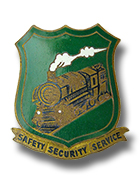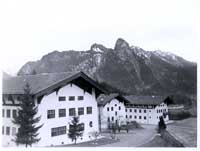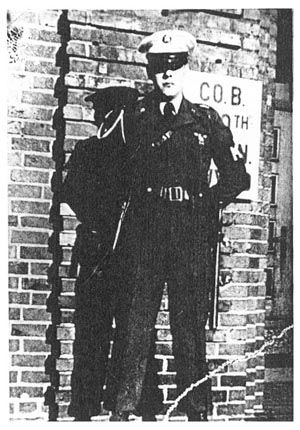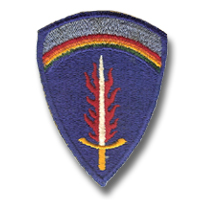If you do
NOT see the Table of Contents frame to the left of this page, then
Click here to open 'USArmyGermany'
frameset |
540th
Military Police Battalion (Railway
Guard)
US Army, Europe
Looking for more information from military/civilian
personnel assigned to or associated with the U.S. Army
in Germany from 1945 to 1989. If you have any
stories or thoughts on the subject, please contact me . .
|
|
|
|
|
| |
| Battalion
History |
|
 540th MP (Railway Guard) Bn crest 540th MP (Railway Guard) Bn crest |
|
| Early 1950s |
| (Source: The
Overseas Weekly, early 1950s - submitted by James W. Berg, 540th MP
Bn) |
|
MP Railway
Guards Find Job Is No Gravy Train
By Allan Dreyfuss
The corporal held out his orders to the GI train guard. He spoke
above the clacking crescendo of the coach wheels as the train left
Paris behind.
"Man, you guys really got it made," he said. "I sure wish I
had your spot just ridin' back and forth on this gravy train."
The guard said nothing. He clenched his fist and tried to restrain
his temper.
The gravy train crack was nothing new for him or the some 300 GI
"riders." Officially, the men are members of the 540th Military
Police Railway Guard Battalion. Unofficially, they find themselves
saddled with one of the most demanding and time exacting jobs in
the American security forces in Europe. Somtimes the job of guarding
rail shipments of American mail or equipment may be exciting or
dangerous but mostly it's a matter of boring routine. But, by no
stretch of even the most elastic GI mind can their mode of transportion
be called a gravy train.
You might think that the run on the overnight train from Frankfurt
to Paris would be top prize for the riders of the 540th. Actually
it rates near the bottom of the ladder. The job is rotated among
all the guards to make it virtually impossible for black marketeers
or smugglers in either Germany or France to establish a working
contact with the GIs. The train's schedule which finds it traveling
throughout the night makes it impossible for the guards to ever
get a glimpse of Parisian "ooo la la" in off duty hours between
trains. To top it off, the guards hardly ever see more of Paris
in daytime than the streets between the station and an army-run
hotel. They usually sleep away most of the free six hours they have
available since they are required to be both awake and alert on
the return trip to Frankfurt that same night. And, although each
guard gets a per diem allowance of $13.25 with which to buy food
on the trip, 99 percent of the "riders" would rather get the Friday
night special run to Garmisch which lays over in that Bavarian resort
for 36 hours.
Riders, track jockeys, or train guards. Whatever name you may call
them, the Army wants them known first of all as MPs. On paper their
job is to protect anything that moves on rails that belongs to the
U.S. Forces... be it quartermaster beef, mail, or vacationing children.
In the books the job totals up to a matter of protection and responsibility
for x numbers of loaded cars between almost any two rail points
in Western Europe. But in practice it adds up to an impossible spec
number that calls for the diverse talents of a railroad yard master,
information clerk, diplomat, detective, and just plain soldier.
Old timers in the outfit like Staff Sergeant Robert Seddon of Roselle,
Ill., remember how the railway security guards had to be regular
Sam Spades to deal with looting of trains.
Nineteen forty-seven was the year before the German currency reform
and the last year that a carton of cigarettes on the black market
represented a two week wage for the average German office worker.
As a result there was looting and pilfering from almost every train
with Army consigned goods aboards.
One wave of high powered thievery really had the GI train guards
scratching their heads in bewilderment. Every freight car leaving
the Bremen docks had its special sliding door linked with twisted
wire and then fastened with a numbered seal. The cars would arrive
in Frankfurt under guard with the seals unborken and no external
signs of tampering but with as much as 600 pounds of coffee or sugar
missing from torn sacks. It finally took a bright-eyed security
guard to discover that the thieves crawled under the freight cars
as they were being made up into trains and bored holes up through
the bottom floor boards. Then after carefully removing the bung,
they would ram a length of pipe up through the opening until it
punctured a bag above and the coffee beans flowed down to waiting
receptacles.
On another occasion at Bremen, one of the security outfit's static
guards came into the sentry house and reported somewhat incredulously
that the freight yard was with drunken Germans. Their breath smelled
suspiciously charged with bourbon and rye. It took a few minutes
tough searching to find the magic spring which gushed out its 120
proof waters. The guards found the thirsty thieves had managed to
slide back the sealed door of a loaded freight, insert a steel rod
and then by manipulating the rod had broken a large number of whiskey
bottles inside. Then, as the precious fluid started to trickle down
between the floor boards, the ingenious Germans waited under the
cars with pots and kettles.
Guarding trains in those days was not without its dangers. In March
1947, military police found the body of GI train guard Pvt. French
Eskew lying between the tracks with the legs severed and a gaping
wound at the back of the skull. In August, six months after the
body had been returned to the U.S. for burial, a CID agent discovered
that the GI had died as the result of a blow on the head which caused
him to fall beneath a train while guarding an army shipment. Later
investigation proved that Eskew's train had been set upon by about
50 looters, as it stopped for water, just outside of Bremen. As
the guard had advanced to disperse the looters, he had been felled
by a blow from behind and left in the path of an oncoming train.
Two Germans were sent to prison for the crime, but the case is not
closed yet.
Sfc. George Young of
Boston, Mass., has been, with the railway security MPs since 1945.
He's ridden as far east as Poland and Hungary on army shipments.
On his trip to Poland in February, 1948 he was a member of a crew
of five GIs and an officer who were held prisoner aboard the train
for 48 hours at the Polish border because they seized 500 American
sparkplugs being smuggled by a Polish repatriate. His trip to Budapest
was in 1946 when a railroad shipment of $1,000,000 worth of gold
bullion being returned from Germany under U.S. auspices was shunted
onto an obscure siding outside the Hungarian capital by Communists
so that a welcoming committee of hundreds at the main station waited
in vain.
According to SOP, "riders" are supposed to
be at the station or freight yard at least 45 minutes before their
train is scheduled to leave. On passenger trains, the guards must
often act as walking information booths on schedules, stops, and
stations. In the history of the organization, only one man ever
got on the wrong train. He was a newly assigned eager-beaver second
lieutenant at Furth, Bavaria, who figuring that the trainful of
household goods he was to guard had arrived early, swung aborad
and found out only after the first stop 100 miles away that it was
an ordinary German freight.
On every trip, be it with mail, passengers, greight, or classified
shipments, each guard must make out a "Guard Trip Report."
This documents is enough to discourage sleepers for on it must be
listed the times
of every stop the train makes from departure point to destination.
Before taking over a freight, the guard must inspect the seal on
each car and then assume responsibility by signing for it. Technically
he could be billed for theft of the car or its contents under a
statement of charges. Although a few guards in the early post-war
period have been court martialed for negligence, today's "riders"
are diligence itself. At each stop on freights, they "walk the line"
of cars tapping on the door seals with their flashlights to ensure
they are, not broken. If there is any sign of tampering, it is listed
for protection on the trip report.
N0 GI train guard is allowed to argue or interfere with German conductors
or brake-men. Often they will be asked to explain or straighten
out a difficulty relating to tickets or a pet rabbit that must be
kept in the baggage car. But, all in all, their relationship is
smooth and bilingually cooperative.
Many of the guards have learned enough German to help them on their
jobs. In the outfit's Berlin detachment there are at least five
Russian-speaking "train riders." One of them, Yugoslav-born Pfc
Zivojin Savick can handle at Ieast six languages. Savick, who was
a bartender at the Frankfurt Casino be-' fore going to the U.S.
as a DP, spent only five months in the states before returning to
Europe as a soldier.
Most of the time, riding the trains is about as routine as walking
guard outside a motor pool. When there is excitement, it comes in
big doses. Corporals Stephen Wallace of Quincy, Mass., and John
Boudreau of Arlington, Mass., found that out when their Frankfurt
to Paris train was rammed last August by an express near Metz. Both
Bay Staters performed heroically in giving first aid and assistance
to passengers aboard the train where 21 died, as well as rounding
up a large number of U.S. mail sacks thrown from the guarded car
by the collision.
Today, German rail police cooperate with the 540th in guarding all
but a few classified shipments. Pilferage had dropped from a monthly
high of $157,000 in January, 1946 to $82.90 for August this year.
By the end of this year, GIs and officers of the 540th will have
ridden on almost 20,000 trains in Germany bringing both "service
and security" to the passengers and goods aboard. And to these hard-working
MPs not one trip will be aboard a gravy train.
|
|
| |
| (Source: Email
from James W. Berg, 540th MP Bn) |
I was a member
of both the 7747 Railway Security Group and "C" Company
of the 540th MP Bn, serving in the Nurnberg "Furth" and Munich detachments.
Headquarters was in Frankfurt, commanded by Col. Staver.
Are you aware that a member of the Frankfurt Detachment worked the
Frankfurt to Paris Mail run. The train he was on had very bad crash.
He won the Soldiers Metal for saving lifes. I think it was in 51-52.
There was a big writeup on it in Stars and Stripes.
There was also a special shipment I was on to Italy in 1950, we brought
a bunch of old P-47s to the Italian Air Force, to Milan Italy. On
railroad flat cars. Italians treated us well. |
|
|
|
|

1.
Jim Berg guards special shipment to Austria (84 KB)
|

2. Berg
checks the manifest (56 KB)
|

3. EUCOM
Intel-MP School, Oberammergau 1950 (95 KB)
|
|
|
|
| |
| 1954 |
| (Source: MILITARY POLICE Journal, July 1954) |
| The proud boast of Co A, 540th Military Police Bn (Railway Guard), in Frankfurt Main, Germany is that it is the most-traveled MP company in any command.
The company's job, along with the other units of the battalion, is the guarding of US mail and classified freight supplies and the patrolling of passenger trains throughout Germany. The job carries the company's 113 enlisted men to the far corners of Germany. A tabulation of guarded and patrolled mileage for 1953 shows an astounding total of 1,152,885 miles, or an average of just slightly under 100,000 miles a month. Operating from Frankfurt/Main, located in the geographical heart of the Western Zone, the company daily performs mail runs to Bruchmuhlbach and Trier, Germany, and halfway through France to Paris. Passengr trains to Kaiserslautern and Munich are patrolled by the 540th. Frequently, there are classified shipments to any and all points in Germany. On these runs, men of the company have guarded trains the length and breadth of Germany. Another boast the company feels safe in making is that it has encountered and dealt with some of the weirdest, most improbable incidents in the history of the Military Police Corps. The company's incident report files cover everything from smuggled black market goods to stunt-happy "buzzings" of trains
by unidentified aircraft. Company A was recently awarded the plaque which is given monthly to the outstanding company of the battalion. The plaque is awarded on the basis of percentage of participation in Soldier's Deposits, new enrollments in USAFI and other off-duty education endeavors, and low frequency in AWOLS, serious incidents, accidents, personal injuries, court-martials, and company punishments. |
|
| |
| 1955 |
| (Source: STARS
& STRIPES, dated Nov 23, 1955; pictures not published with the
article but supplied by Jim Turcotte) |
540th Assists
American Travelers in Germany
The Frankfurt-bound D-284 had just pulled out of Bremerhaven's main
railway station one morning last month when PFC Burt Pedersen of Co.
"B," 540th MP Railway Guard Battalion, began making a routine
check of the train. He noted two American children and their mother
were aboard.
It wasn't long before the D-284 was pulling into Hanover. After losing
some old passengers and taking on some new ones the train resumed
its journey toward Frankfurt. |
 |
|
As
the D-284 was barreling across the German countryside about
15 minutes out of Hanover, the American woman, who said her
name was Mrs. Foxton, hurriedly approached Private Pedersen
and told him that her two children, Joe and Mary, were aboard
a pair of cars which had been uncoupled at Hanover and transferred
to a Munich-bound train.
Fast Action
Thinking quickly, Private Pedersen realized that both trains
would stop at the next town, Goettingen. Luckily, he informed
Mrs. Foxton, the Frankfurt train would arrive first.
When they reached the town both Pedersen and Mrs. Foxton left
the D-284 and awaited the Munich train. No sooner had it pulled
in than Pedersen was aboard informing the German authorities
of the mixup. A search was immediately begun and the two youngsters
were quickly found. Mrs Foxton could hardly thank Pedersen enough
for his quick-witted performance.
Have Many Assignments
This incident shows that the work of the 540th by no means ended
when the old familiar Frankfurt duty run ceased to operate,
last summer. Military policemen of Co. "B" travel
aboard two regularly scheduled German civilian trains out of
Bremerhaven every day.
The also offer information and assistance and keep order on
the daily Berlin duty run and on troop trains running between
Bremerhaven and Zweibruecken as well as accompanying military
cargo shipments to US installations in Germany.
PHOTO: Jim Turcotte, B Company, 540th MP Bn (RG), 1954-55
|
|
 |
|
Only the first and third platoons of Co. "B" are stationed
in Bremerhaven. The second platoon, in Berlin, performs similar
duties on different runs. Its men ride the Frankfurt-Berlin
duty trains, escort VIP's through the Berlin-West Germany corridor,
and also accompany freight shipments.
540th is Unique
Co. "B," commanded by Capt Richard B. Grames, is a
vital part of a unit which is unique in that it is the only
MP railway guard battalion in Germany.
The military policemen of the 540th ride the rails to assist
American passengers in any way possible. No request is too small,
no injury too foolish for them. No one need hesitate to approach
the railway MP's for help. That is their job. The best friend
of the American train passenger in Germany - that is the military
policeman from the 540th MP Railway Gard Battalion.
PHOTO: B Co, 540th MP Bn was located at Marine Barracks,
Bremerhaven |
|
|
| |
| (Source: STARS
& STRIPES, dated Nov 23, 1955; pictures not published with the
article but supplied by Jim Turcotte) |
540th MPs
Ride German Rails As Escorts for Yanks, Property
As trains bearing
U.S. servicemen and property speed through Germany, watchful military
policemen who ride them day and night make certain that all goes well.
They are members of the 540th MP Bn Railway Guard, one of the Army's
most unusual organizations. As members of one of the two railway guard
units in the Army, the men engage in all phases of military police
work while carrying out their primary mission of providing escorts
for passenger trains and guarding mail and supplies shipped by rail.
Established in Paris in 1945, the unit's nerve center now is in Frankfurt.
The battalion covers an area from Bremerhaven to Garmisch and from
Berlin to Paris. Commanded by Lt Col Eugene J. Carson, the 540th uses
one of the most complex communications systems in the world - a railway
self-connecting dial system. The system permits a member of the 540th
to turn a dial to learn the whereabouts and condition of any train
operation in Germany.
The life of a railway guard begins and ends with travel. Suppose,
for instance you are Sp3 Joseph A. Strumpf. At 8 am you are called
to the company orderly room, where Sgt Henry Bieganski points to his
operations board and says, "Strumpf, tonight you'll ride the Berliner."
You check in at the inspection point, receive your instructions and
orders, and draw your weapon and your railway security pass. It proves
you're a member of the 540th -- in four languages, including Russian.
Train Commander
You learn that accompanying you
on this trip are Pvt Alvin W. Downs and Lt Robert W. Irwin, of the
8th Trans Gp. Irwin is your train commander.
Early that evening, when you arrive at the station, the posting NCO
gives you a final check, and your's ready to go to work.
Before each passenger boards the train you check his identification
and travel orders and the Russian translation of the orders.
Your train has nine cars -- two mail cars, four sleepers, a diner,
coach, and baggage car. Since there are mail cars, there are other
members of the 540th on the train. These men will be in fatigues,
and will have drawn their rations and carbines prior to boarding the
cars.
Ready for Journey
Now you're ready for the journey. You check to see that everything
is in order and if the passengers require assistance.
Along the way, when the train halts, you leap out to make certain
the wheels are not overheated and that all curtains are drawn. At
Helmstedt, the Berliner stops to pick up an interpreter. You'll need
him at Marienborn, the check point along the corridor through the
Soviet Zone. Everything runs smoothly at Marienborn, and you're as
good as in.
At Berlin, there's a three-day layover. You check in at Andrews Barracks
and turn in your weapon. Then you're off. "Well, I've earned
this," you think. And you have. |
| |
If you have more information on the history or organization of the 540th MP Bn, please contact me . . |
|
 |
|
 540th MP (Railway Guard) Bn crest
540th MP (Railway Guard) Bn crest 




